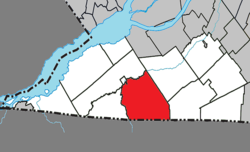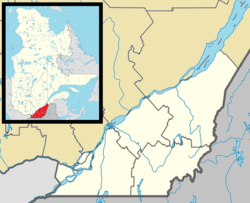Hinchinbrooke
| Hinchinbrooke | |
|---|---|
| Municipality | |
 Location within Le Haut-Saint-Laurent RCM. | |
| Coordinates: 45°03′N 74°06′W / 45.050°N 74.100°WCoordinates: 45°03′N 74°06′W / 45.050°N 74.100°W | |
| Country |
|
| Province |
|
| Region | Montérégie |
| RCM | Le Haut-Saint-Laurent |
| Constituted | July 1, 1855 |
| Government | |
| • Mayor | Normand Crete |
| • Federal riding | Beauharnois—Salaberry |
| • Prov. riding | Huntingdon |
| Area | |
| • Total | 150.20 km2 (57.99 sq mi) |
| • Land | 149.30 km2 (57.65 sq mi) |
| Population (2016) | |
| • Total | 2,103 |
| • Density | 14.1/km2 (37/sq mi) |
| • Pop 2011-2016 |
|
| • Dwellings | 1,186 |
| Time zone | EST (UTC−5) |
| • Summer (DST) | EDT (UTC−4) |
| Postal code(s) | J0S 1A0 |
| Area code(s) | 450 and 579 |
| Highways |
|
Hinchinbrooke is a rural community in southern Quebec, in the Châteauguay Valley, in the MRC de Le Haut-Saint-Laurent. The population as of the Canada 2011 Census was 2,242.
Since the 1980 dissolution of Huntingdon County, Hinchinbrooke is within Le Haut-Saint-Laurent Regional County Municipality.
The municipality is situated along the Canada–United States border.
The following locations reside within the municipality's boundaries:
The following waterways pass through or are situated within the municipality's boundaries:
The primary industries in Hinchinbrooke are agriculture, with dairy cattle and apple farming being the most prevalent sub-sectors.
Sir William Hales Hingston, physician and mayor of Montreal from 1875 to 1877, was born in Hinchinbrooke.
...
Wikipedia

